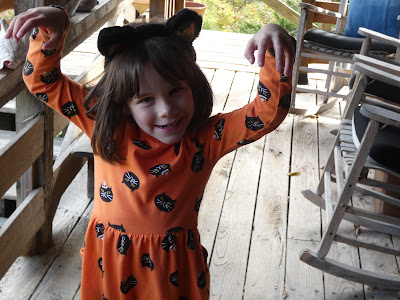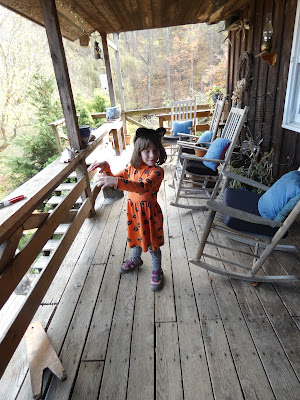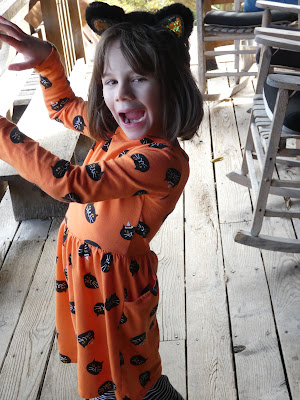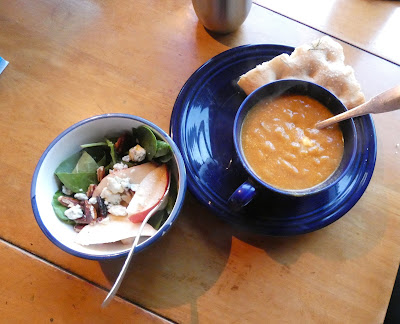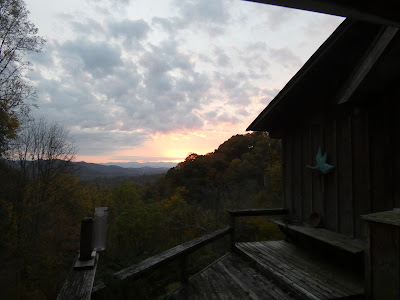The little
house was all but empty now. Odds and ends had been distributed to
friends—Elizabeth had been speechless when Dor’thy had handed her Birdie’s
journals—a collection of composition books dating back to the Forties. “She said
you was to have them.” And under Dor’thy’s supervision, Calven and Travis (Bernice’s
boy) had worked hard to remove and rehome the furniture and appliances —two
beds, two dressers, a wood stove, the television set, and the plastic
upholstered sofa. Birdie’s worn recliner sat forlorn in the middle of the
living room, listing slightly to the right.
As Elizabeth
looked at it, the lump in her throat grew and tears began to spill down her
face.
Git you a
cheer, Lizzie
Beth.
She gasped
and whirled around, looking for the person who’d sounded so like Birdie that
she expected to see her hobbling toward her recliner.
“Who is it?”
Her voice was shaky and even as she spoke, she began a circuit of the few rooms
of the house. “Who’s there?”
A soft
chuckle sounded in her ears. “Lizzie Beth, hit’s me—Birdie. Course I ain’t
what you might call here—not so’s you can see me. But, honey, I ain’t
going nowheres. I’ll be talking to you right along.
…
And so she
had, thought Elizabeth, as once more she made her way up the steep road to the
graveyard. Her voice was clearest, perhaps, when Elizabeth was reading the
journals—Don’t pay no attention to my spelling, honey. I reckon though you
can make out my meaning. Or Just you skip past all that sorrowful talk
when my babies died. I didn’t know then what I know now.
Only this
morning the familiar voice had spoken, just before Elizabeth opened her eyes. Reckon
you’ll be making a spice cake today. Course we can visit any time, but I kindly
like to see the old ways carrying on.
Elizabeth
shifted the basket on her arm. “Here I am, Birdie, with the spice cake.”
The low
chuckle answered her. I knowed you’d bring it.
“Miss Birdie,”
Elizabeth whispered, “tell me about . . . what was it like? Dying, I mean.”
…
When the call came from Dor’thy, Elizabeth had half expected it. “Well, Lizzie Beth, our Miss Birdie’s passed. I was in the kitchen fixing us some lunch when I heard her call out. “You?” she said, and when I got to her, she was already gone. But what I want you to know is, there was a look on her face you wouldn’t hardly believe. I don’t know how to tell it except that it was a look of the purest happiness.”
…
“Dor’thy
said you looked happy, Miss Birdie . . .”
Honey, it
was the quarest thing. I was laying there in that old recliner, wishing I didn’t hurt
all over, wishing I could still get out and about, and thinking about all the
ones that had gone before. And then, all at once, hit was like my heart exploded and
little golden specks like dust in the sunlight was coming out of it and it was like I was watching them specks and at the same time I was one of them specks. And then I
saw someone in the doorway. Or it was a whole bunch of someones—Luther, Granny
Beck, Cletus, Belvy, all my angel babies—a great throng that was coming toward
me and wrapping my tired old body in love like a great feather bed. Now,
understand—I didn’t
see all them folks—no more than you can see me—but they was realer than life
and they was welcoming me to . . . well, wherever it is that I am--the place I been traveling to all along.
“Birdie—your
journals, they. . . they-”
Lizzie
Beth, I give them to you on account of how you love all them old stories. I ain’t
told you half of them yet and there’s more wrote down in them copybooks. You
just listen out for me as you read, and I’ll be talking to you right along..
…
The spice cake had been distributed among the graves and the last bit had been set on the stone that served Luther and Birdie—Birdsong
Gentry- 1922-2022--Gone home. Crisping leaves covered the raw earth on Birdie’s side. I ain’t
there, Honey, but you know that. All us Quiet Ones, we're in the wind and the
rain and the trees . . . we're everywhere . . .
As Elizabeth
turned to make her way down the road, a sudden breeze brought down more leaves, lifting the fallen ones in a whirlwind of red and gold and brown. They
swirled about her, and there were joyous singing and dancing shapes in the circling
leaves that rose up above her head and then, as quickly as they had come, subsided. Elizabeth stood wondering--dazzled and deeply comforted.
. . .
Later that
evening, dishes done and Phillip dozing, an open book on his chest, Elizabeth reached
for a journal. That’s a good ‘un, Honey. Bout midway through there’s the
tale of Pink Smathers and his one-eyed mule.
Elizabeth smiled and began to read . . .
NOTE: We'll hear more of these journals and Miss Birdie. Miss Birdie abides.



